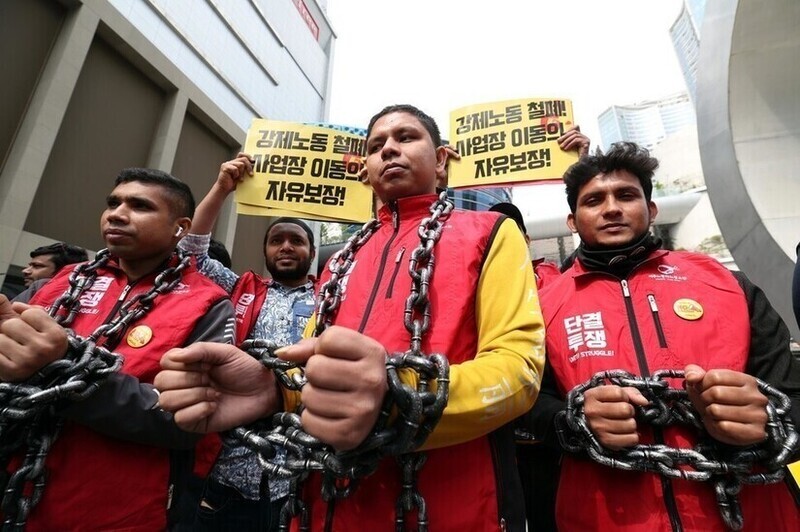hankyoreh
Links to other country sites 다른 나라 사이트 링크
[Reporter’s notebook] To accept migrants isn’t enough — Korea must fight their exploitation


By Lee Jun-hee, national correspondent
In April 2023, I went to Paris to cover immigration policy. After landing at the Paris Charles de Gaulle Airport, I took the metro. As I traveled through the area north of Paris, where many migrants reside, I seldom saw any white passengers.
Things were different when I reached my hotel in the heart of downtown Paris, as many of the passersby on the street were white. There, I only saw Black people in certain places — as street vendors in front of the Eiffel Tower, hotel cleaners, museum guards, et cetera. It was as if certain jobs were reserved for people of color, demonstrating the appearance of a class system based on race.
While France openly embraces migrants, deep-rooted inequality exists in its society. Any sort of respect for migrants crumbles in the face of capitalist logic, which needs to exploit cheap labor for profit.
While certain concessions can be expected when one is a migrant, the low wages that they typically receive are easily attributed to lack of effort, ability, or laziness, which is sometimes described as a characteristic particular to certain races. The system that pushes them into low-wage jobs is hardly, if ever, given the same attention.
Is it any better in South Korea? The Yoon Suk-yeol administration has brought up immigration policies as a solution to the drastically declining birth rate and depopulation in rural and suburban areas.
As part of that policy, it has expanded the number of non-professional occupation visas (E-9) it will grant this year to 165,000, higher than ever before. In four regions, including Seoul, migrants will be able to work in hotels or restaurant kitchens starting from the latter half of the year. Seoul is also launching a pilot program for bringing in international domestic workers.
What these policies want to achieve is clear. Foreigners will be put in jobs that South Koreans are unwilling to do. At the same time, measures such as tighter surveillance and harsher penalties are being put in place to keep the migrants in poor-paying jobs.
The Ministry of Justice launched a major crackdown on undocumented migrants last year, arresting more than 38,000 people. A policy that prevents migrant workers from changing jobs remains firmly in place, despite being criticized as an infringement on the freedom of workers.
Of course, this has come with serious side effects. In November 2023, a video of a male Justice Ministry employee dragging a female migrant worker out in a headlock during an immigration raid at a factory in Gyeongju, North Gyeongsang Province, prompted public outrage.
Hanshin University, located in Osan, Gyeonggi Province, shocked the country when it was belatedly revealed that on Nov. 27 of last year, 22 Uzbekistan students at the university’s language school were forced to depart the country, with security guards being deployed to intimidate them and to confiscate their phones. Such measures were taken after the school claimed that the students were in danger of being labeled as undocumented migrants.
The administration’s heavy-handed immigrant policy has been criticized from many corners. There are many complaints coming from rural areas, where labor is scarce, as well as from businesses in the Seoul metropolitan area. Of course, regions that are being held afloat by the labor of migrant workers are also expressing such sentiments.
This situation has led to recent calls from both sides of the aisle for the easing of restrictions on migrants. Many are advocating for society to recognize and embrace differences in the search for coexistence.
While I sympathize, I also have my reservations. I can’t help but suspect that once the layers of nation, ethnicity, and race are discarded, we will be privy to a system that can only be sustained through exploitation. The heart of the issue isn’t the divide between foreigner and Korean, but undesirable labor. For that reason, what needs to change before anything else is labor conditions.
Let’s use our crystal ball to imagine Korea down the road a few generations. What if the children of the very migrants from across Asia who’ve flocked to and filled low-wage positions in Korea become critical of the exploitation that their parents endured? What if they label as “modern-day slavery” Korea’s policy toward migrants, which forces them into low-wage labor and brands them as “illegals” subject to punishment when they attempt to flee poor workplace conditions?
Should we understand this as a migrant issue, or a class one? Will mere receptiveness to migrants be enough to prevent this type of rage that will accumulate from generation to generation?
In his book “Capitalism and Slavery,” historian Eric Williams asserts that racism did not birth the Black chattel slavery system, but quite the opposite: the systematic enslavement of Black people in fact birthed racism. It was the systematic enslavement of Black people that allowed for the accumulation of capital from excess profits that fueled Western industrialization, Williams argues, and racism emerged as a logic for justifying this process.
“The political and moral ideas of the age,” William wrote, must “be examined in the very closest relation to economic development.”
For this reason, we must go beyond the mere acceptance of migrants. Together, we must endeavor to create bonds of solidarity that can overcome systems of exploitation.
Please direct questions or comments to [english@hani.co.kr]

Editorial・opinion
![[Column] Season 2 of special prosecutor probe may be coming to Korea soon [Column] Season 2 of special prosecutor probe may be coming to Korea soon](https://flexible.img.hani.co.kr/flexible/normal/500/300/imgdb/original/2024/0426/3317141030699447.jpg) [Column] Season 2 of special prosecutor probe may be coming to Korea soon
[Column] Season 2 of special prosecutor probe may be coming to Korea soon![[Column] Park Geun-hye déjà vu in Yoon Suk-yeol [Column] Park Geun-hye déjà vu in Yoon Suk-yeol](https://flexible.img.hani.co.kr/flexible/normal/500/300/imgdb/original/2024/0424/651713945113788.jpg) [Column] Park Geun-hye déjà vu in Yoon Suk-yeol
[Column] Park Geun-hye déjà vu in Yoon Suk-yeol- [Editorial] New weight of N. Korea’s nuclear threats makes dialogue all the more urgent
- [Guest essay] The real reason Korea’s new right wants to dub Rhee a founding father
- [Column] ‘Choson’: Is it time we start referring to N. Korea in its own terms?
- [Editorial] Japan’s rewriting of history with Korea has gone too far
- [Column] The president’s questionable capacity for dialogue
- [Column] Are chaebol firms just pizza pies for families to divvy up as they please?
- [Column] Has Korea, too, crossed the Rubicon on China?
- [Correspondent’s column] In Japan’s alliance with US, echoes of its past alliances with UK
Most viewed articles
- 1‘We must say no’: Seoul defense chief on Korean, USFK involvement in hypothetical Taiwan crisis
- 2Is Japan about to snatch control of Line messenger from Korea’s Naver?
- 3Division commander ordered troops to enter raging flood waters before Marine died, survivor says
- 4[Editorial] Korea’s surprise Q1 growth requires objective assessment, not blind fanfare
- 5[Column] Season 2 of special prosecutor probe may be coming to Korea soon
- 6[Special report- Part III] Curses, verbal abuse, and impossible quotas
- 7Flying “new right” flag, Korea’s Yoon Suk-yeol charges toward ideological rule
- 8[Guest essay] The real reason Korea’s new right wants to dub Rhee a founding father
- 9[Column] ‘Choson’: Is it time we start referring to N. Korea in its own terms?
- 10[Column] Park Geun-hye déjà vu in Yoon Suk-yeol